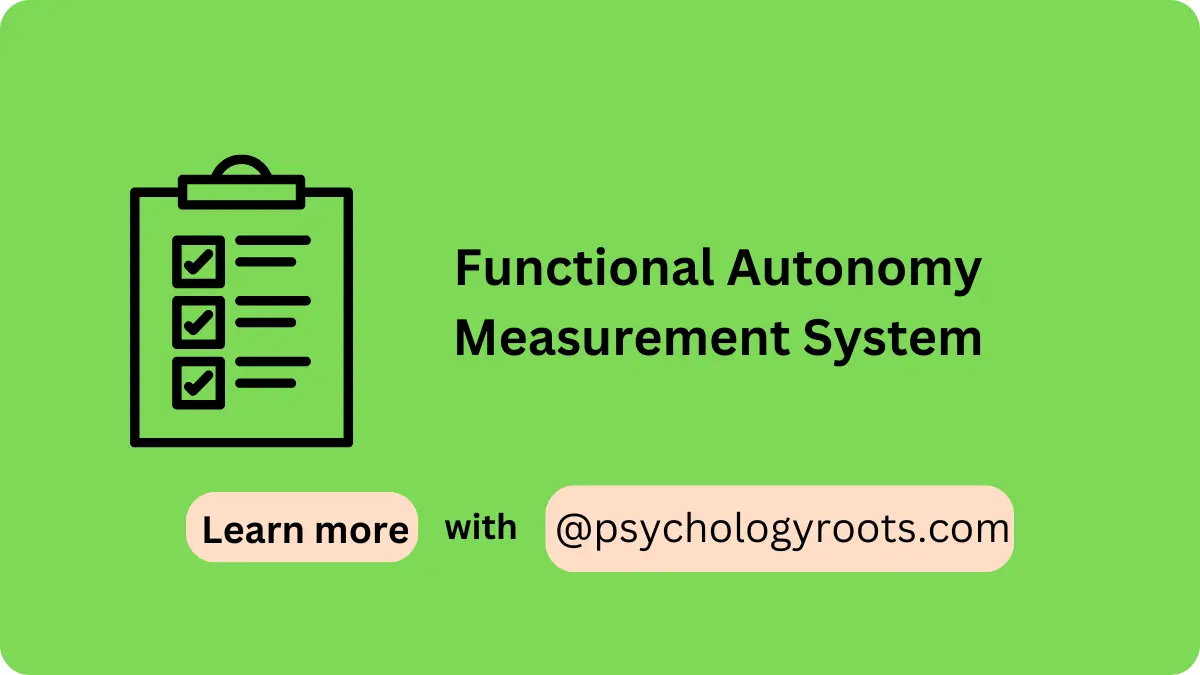Table of Contents
Functional Autonomy Measurement System
Here in this post, we are sharing the “Functional Autonomy Measurement System”. You can read psychometric and Author information. We have thousands of Scales and questionnaires in our collection (See Scales and Questionnaires). You can demand us any scale and questionnaires related to psychology through our community, and we will provide you with a short time. Keep visiting Psychology Roots.
About Functional Autonomy Measurement System
Scale Name
Functional Autonomy Measurement System
Author Details
Réjean Hébert
Translation Availability
English

Background/Description
The Functional Autonomy Measurement System (SMAF), developed by Réjean Hébert in 1984 and revised in 1993 and 2001, is a 29-item clinician-rated scale designed to assess functional autonomy in elderly patients (65+ years) for routine assessments, home care allocation, institutional admission decisions, and needs-based health care planning. Published in Age and Ageing (1988) and The Gerontologist (1993), the SMAF extends the WHO’s impairment-disability-handicap framework by incorporating social and material resources that compensate for disabilities. It defines handicap as the gap between disability and available resources (e.g., family support), adding a prognostic dimension for social vulnerability. The SMAF assesses five domains: Activities of Daily Living (ADLs, 7 items: e.g., eating, bathing), Mobility (6 items: e.g., walking, transfers), Communication (3 items: e.g., hearing, speaking), Mental Function (5 items: e.g., memory, judgment), and Instrumental Activities of Daily Living (IADLs, 8 items: e.g., shopping, finances).
Each item is rated on a 5-point scale (0 = independent, -3 = fully dependent, with intermediate levels added in 1993) based on actual performance, assessed via patient/relative interviews or observation/testing. Total disability scores range from 0 to -87 (more negative = greater disability). Handicap scores are zero if resources compensate fully, otherwise equaling the disability score. Stability of resources is estimated for 3–4 weeks. The SMAF was validated with 146–1,997 elderly individuals (mean age ≈ 70–85 years, mixed gender, Canada-based, community and institutional settings). It correlates with nursing care time (r = 0.88–0.92) and predicts care needs (e.g., score of 20 ≈ 40 minutes daily care). The SMAF is used in geriatrics, rehabilitation, and health policy, with a computerized version for care planning. Access requires permission from Hébert or Age and Ageing.
Administration, Scoring and Interpretation
- Obtain the SMAF from Hébert et al. (1988, 1993) or authorized sources (e.g., Age and Ageing, The Gerontologist), ensuring ethical permissions.
- Explain to participants (elderly 65+ or caregivers) that the scale assesses functional autonomy and support resources, emphasizing confidentiality and voluntary participation.
- Administer the 29-item scale in clinical, community, or institutional settings via interview or observation by a trained physician, nurse, or social worker, rating current performance and resource stability.
- Estimated completion time is ~42 minutes.
- Ensure a private, supportive environment; provide geriatric or mental health resources (e.g., home care services) and adapt for accessibility (e.g., simplified language) if needed.
Reliability and Validity
The SMAF demonstrates robust psychometric properties (Hébert et al., 1988; Desrosiers et al., 1995). Inter-rater reliability (N = 146, 30 raters) shows an overall kappa of 0.75, with subscale kappas of 0.58 (mental function) to 0.76 (IADLs); a study of 45 elderly (pairs of nurses) reports an overall ICC of 0.96 (subscales 0.74–0.96). Test-retest reliability over two weeks (N = 45) yields an ICC of 0.95 (subscales 0.78–0.96), with item kappas of 0.45–0.95. Internal consistency is not explicitly reported but inferred as moderate to high (Cronbach’s alpha ≈ 0.80–0.90) based on scale structure.
Convergent validity is supported by correlations with nursing care time (r = 0.88, N = 146; r = 0.92, N = 1,997), particularly for ADL (r = 0.89) and mobility (r = 0.83). Factor analysis aligns items with WHO classifications. Criterion validity is evidenced by predicting care needs (e.g., score of 40 ≈ 2 hours daily care). Discriminant validity is shown by lower correlations for communication/mental functions (r < 0.60). Pairing with the Mini-Mental State Examination or Barthel Index enhances comprehensive assessment.
Available Versions
29-Items
Reference
Hebert, R., Carrier, R., & Bilodeau, A. (1988). The Functional Autonomy Measurement System (SMAF): description and validation of an instrument for the measurement of handicaps. Age and ageing, 17(5), 293-302.
Important Link
Scale File:
Frequently Asked Questions
What does the Functional Autonomy Measurement System measure?
It measures functional autonomy in ADLs, mobility, communication, mental function, and IADLs, plus resource availability, in elderly patients.
Who is the target population?
Elderly adults (65+) in community or institutional settings.
How long does it take to administer?
Approximately 42 minutes.
Can it inform interventions?
Yes, it guides home care allocation, institutional decisions, and health care planning.
Disclaimer
Please note that Psychology Roots does not have the right to grant permission for the use of any psychological scales or assessments listed on its website. To use any scale or assessment, you must obtain permission directly from the author or translator of the tool. Psychology Roots provides information about various tools and their administration procedures, but it is your responsibility to obtain proper permissions before using any scale or assessment. If you need further information about an author’s contact details, please submit a query to the Psychology Roots team.
Help Us Improve This Article
Have you discovered an inaccuracy? We put out great effort to give accurate and scientifically trustworthy information to our readers. Please notify us if you discover any typographical or grammatical errors.
Make a comment. We acknowledge and appreciate your efforts.
Share With Us
If you have any scale or any material related to psychology kindly share it with us at psychologyroots@gmail.com. We help others on behalf of you.